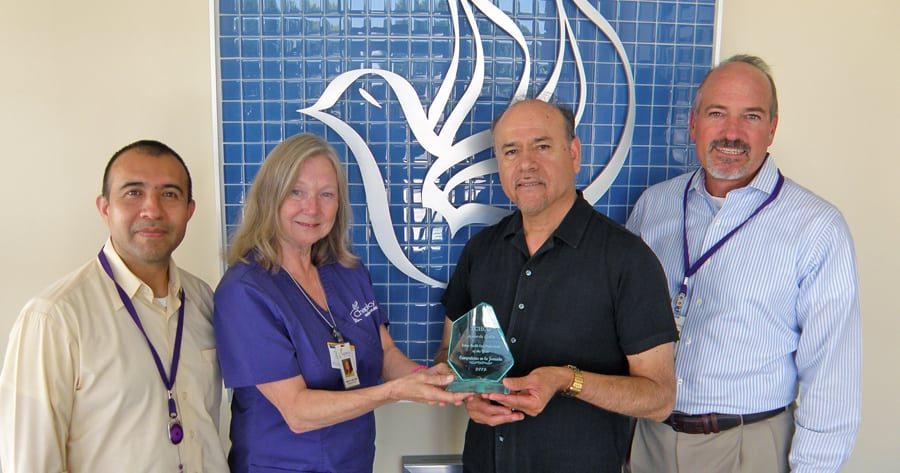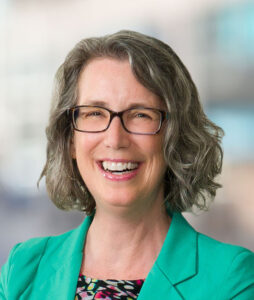
Home » Chaplaincy team serving more Hispanic families through hospice care
Chaplaincy team serving more Hispanic families through hospice care

August 11, 2017
The hospice team members dispatched to assist Hispanic families caring for a dying loved one know they must use a different approach to earn their trust.
The Chaplaincy Health Care team knows it’s best to seek out the patriarch of the family and use titles like “Señor” or “Señora” until given permission to use first names. They know they must honor the family’s desire to care for their relative at home, as well as their faith traditions.
Providing more bilingual and bicultural hospice services has long been a goal of the Kennewick agency that provides hospice, palliative, grief and behavioral health care to the Tri-City community.
Five years ago, the agency formed a Hispanic Outreach Team, which includes a bilingual and bicultural nurse, social worker, chaplain and nursing assistants, to better serve the area’s growing Hispanic community.
The team knew it had a lot of work to do to earn the Hispanic community’s trust.
Hospice is often seen as a place to “dump relatives to die by themselves, alone” in Mexico and South American countries, said Chaplain Victor Ortega, one of the team’s members.
“Our purpose is to re-educate people that hospice here in the states is where we provide spiritual and physical and emotional care so patients can have quality of life while respecting and honoring their own beliefs and traditions,” he said.
The group’s efforts are beginning to pay off.
The agency has noted a 2.5 percent increase in serving the Hispanic population since it began focusing on outreach and education.
In 2016, 8 percent of hospice patients served were Hispanic. That’s up from 7.6 percent in 2015 and 5.6 percent in 2014.
Last year, hospice served a total of 79 patients.
Nationwide, 7.1 percent of all hospice patients served in 2014 identified themselves as Hispanic or Latino, according to a 2015 report from the National Hospice and Palliative Care Organization. About a quarter of hospice patients nationwide identified themselves as minorities that same year, the report said.
Executive Director Gary Castillo knew outreach was a key part of educating the community about the services provided. The agency joined the Tri-Cities Hispanic Chamber of Commerce and began hiring bilingual staff. It formed an advisory board. Hospice material was translated into Spanish.
Ortega said there’s no greater honor than helping a family help their loved one transition from life to death.
“For me, it’s a privilege to hear people’s life story and to be allowed into their homes and learn about themselves, about their humanity. It’s a privilege and honor to be there when they’re going to die. For me, those are sacred moments to be able to go into somebody’s home who isn’t related to you and provide some kind of support,” he said.
Nurse Anita Mundy, who has been a bilingual case manager for Chaplaincy for 11 years, said her caseload used to be made up of four to five Hispanic patients, but today her caseload is 50 percent Hispanic.
Mundy, who also serves on the team, said using the correct language with families is important, but more important is understanding Latino culture. “We’re very mindful of that,” she said.
“We will do our best to provide quality of life and respect their traditions,” Ortega agreed.
Oretega also said it’s not easy work.
“We have to work a little harder because a good number are undocumented and they’re not knowledgeable of our services. It creates more work,” he said.
No one is ever turned away from services because of inability to pay, Castillo said.
That’s why community support of Chaplaincy Health Care is so important, he said. “We appreciate the community’s financial support,” he said.
Chaplain Alberto Tass said the team’s efforts are making a difference.
“I’m seeing we are making progress and we can see that second generation is more acceptable to move toward hospice in a good sense and positive way. This is something starting to happen now with the second generation. They are learning new things here,” he said.
The program has expanded to include grief services after a loved one’s death.
“It’s a great experience touching people who have lost someone. Sometimes it can be a baby, brother, mother, sister, father — we never know. Once the loss hits the family, they need the support,” Tass said.
Tass said the team will continue to stand ready to help in the days ahead.
“In time of distress and time of crisis and time of anything like that can be challenge for them, we are here for them. We are in the community and part of the community and don’t hesitate to call us and support you,” he said.
For more information, call 509-783-7416 or visit chaplaincyhealthcare.org.
Local News Diversity
KEYWORDS august 2017




